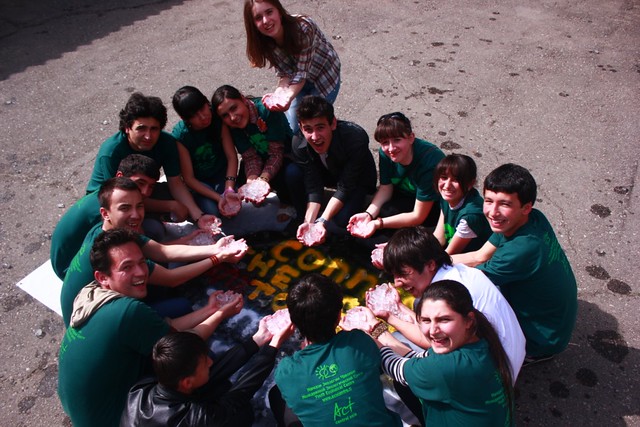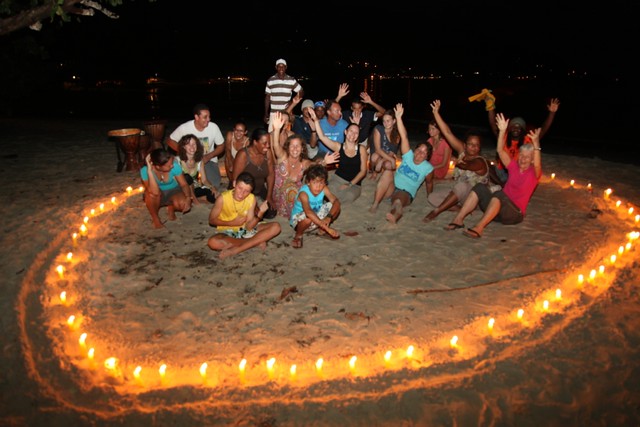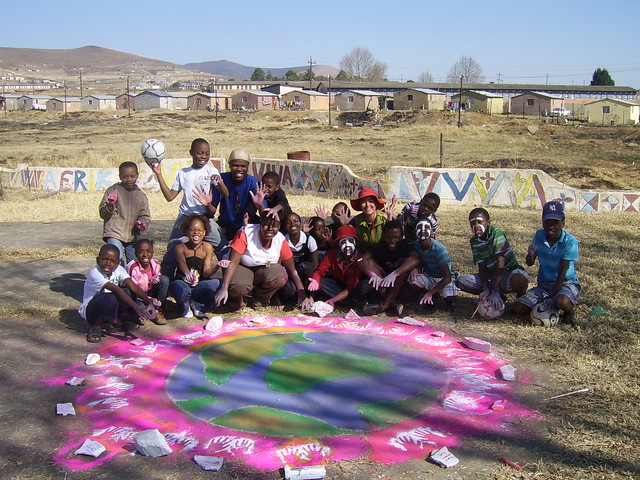Alarm and hope
How many hours have you spent today following the ever-expanding stream of Connect the Dots photos?
Personally I can't help looking through it over and over again, with strong but mixed emotions. I see people from India, Namibia, Britain, Brazil and USA and think how diverse we are, how different are our ways of living and how many challenges every one of us has overcome each day. And then, how similar we are and how together we form a huge family, united by common alarm and hope.
Burned forests of Siberia, melting glaciers of the Pamir and landslides in the mountains of Azerbaijan - these are only few of the first severe effects of climate change that have forced people in my region to join the Climate Impacts Day campaign.
So, on May 5th creative demonstrations in Russia, Ukraine, Georgia, Azerbaijan, Kazakhstan, Kyrgyzstan and Tajikistan have become part of the global movement. My dear friends! Do be proud of yourselves - and I wish you to have all the courage to continue your important work.
Here are the photos Connecting the Dots from Eastern Europe and Caucasus to Central Asia and Russia. The first piece of them was posted here.
In Dushanbe, Tajikistan, Aziz and his team have organized a lecture about melting Pamir with the professional glaciologist. Afterwards, together with the local boarding school students they made an icy flash-mob – showing how fast the mountain ice can melt leaving no water for tomorrow.

Drought in Orlando Florida
Orlando students from IDEAS (Intellectual Decisions on Environmental Awareness Solutions) biked down the Little Econ Greenway alongside the river. The arrow points to the climate dot where the river has dried up and turned to sand. Orlando drought, what's this about??!!

Connecting the dots at the UN’s University of Peace in Ciudad Colon Costa Rica

We had several great events across Afghanistan Saturday but not in the Wardak Region
because, as this photo from our organizer shows, people are concentrating on sheer survival at the moment. Here's his note: T"he floods last week destroyed the tents of Nomads (Kochis) in Behsud area located in Wardak Province of Afghanistan. The floods surrounded the families with their animals from both side ( as you can see in the picture attached) leaving no way for them to get out." We'll keep them in our prayers and work doubly hard in the rest of the world
A fiery dot on the beach in the Seychelles
where a rising ocean may put out those candles some day unless we get to work!

Panauti in Nepal, where multiple generations gathered
to connect the dots on the extreme weather they've experienced: unseasonal rainfall, drought, disappearance of aquatic creatures, and more. Climate change has also affected religious norms there— while they used to practice holy bathing in the local river, today there is almost no water in the river and what there is is heavily polluted. Around 15 years ago there used to be a constant flow of clean water throughout the year.

From the Bazaruto Archipelago in Mozambique, a watery dot!
the ever more acidic ocean is a real threat to dugongs and other sea life!
Young people at UWC Mostar in Bosnia and Herzegovina build a bridge to the future!

Great artists in Mpophomeni Township, South ‘Africa
sent us this beautiful image

"Best wishes for Mother Earth" - the Mpophomeni Enviro club kids created
this "dot" using the coloured powder that is used in the Hindu Holi
festival of colour. Their wishes and promises for the planet will be washed
into the ground when it rains, and all that will remain are the rocks they
placed around their art.
In a lead-up to Connecting the dots day, the Mpophomeni Enviro-club
kids researched the effects of climate change in their region. They
discovered that the biggest threat to South Africa is a loss of water and
food security. Mpophomeni Township is situated in a wetland area in the
uMngeni River Catchment, a catchment that supplies water to over 4million
people. Climate change affects rainfall distribution patterns and
increases evaporation rates, which in turn affects the functioning of the
wetlands that clean and regulate our water supply. South Africa is a
water-vulnerable country, and already some regions are experiencing water
shortages.
This group of kids have been actively learning about and taking action
against Climate Change for three years now, they have made their own
educational movie about the local effects of climate change, and have
participated in 10/10/10 and the Moving Planet Day. Follow their progress
at mmaep.co.za
From Queensland in Australia, which knows too much about climate trouble
Participants at the Woodford Folk Festival planted 3600 trees this weekend, concentrating on the fact that they'll help store some carbon!
